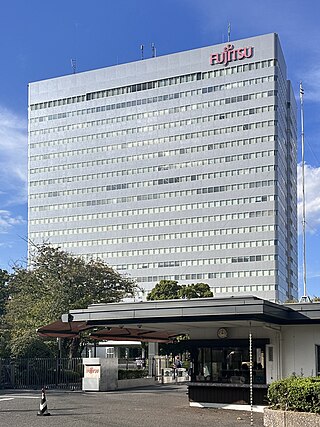
Janet is a high-speed network for the UK research and education community provided by Jisc, a not-for-profit company set up to provide computing support for education. It serves 18 million users and is the busiest National Research and Education Network in Europe by volume of data carried. Previously, Janet was a private, UK-government funded organisation, which provided the JANET computer network and related collaborative services to UK research and education.

Acorn Computers Ltd. was a British computer company established in Cambridge, England in 1978 by Hermann Hauser, Chris Curry and Andy Hopper. The company produced a number of computers during the 1980s with associated software that were highly popular in the domestic market, and they have been historically influential in the development of computer technology like processors.

Fujitsu Limited is a Japanese multinational information and communications technology equipment and services corporation, established in 1935 and headquartered in Kawasaki, Kanagawa. It is the world's sixth-largest IT services provider by annual revenue, and the largest in Japan, in 2021.

Logica plc was a multinational IT and management consultancy company headquartered in London and later Reading, United Kingdom.

The British Computer Society (BCS), branded BCS, The Chartered Institute for IT, since 2009, is a professional body and a learned society that represents those working in information technology (IT), computing, software engineering, computer engineering and computer science, both in the United Kingdom and internationally. Founded in 1957, BCS has played an important role in educating and nurturing IT professionals, computer scientists, software engineers, computer engineers, upholding the profession, accrediting Chartered IT Professional (CITP) and Chartered Engineer (CEng) status, and creating a global community active in promoting and furthering the field and practice of computing.
NEC Software Solutions, formerly Northgate Public Services, is a provider of specialist software and outsourcing services for the public sector and is based in the United Kingdom. This followed its acquisition by NEC Corporation in January 2018.

AWA Technology Services, formerly named Amalgamated Wireless (Australasia) Ltd, is an Australian communications technology company. Throughout most of the twentieth century, AWA was Australia's largest and most prominent electronics organisation, undertaking development, manufacture and distribution of radio, telecommunications, television and audio equipment as well as broadcasting services.
Unipart Group is a British multinational logistics, supply chain, manufacturing and consultancy company headquartered in Cowley, Oxfordshire, England. It has operations in Europe, North America, Australia and Japan and works across a variety of sectors that include automotive, retail, technology and rail. It is one of the largest privately-owned companies in the UK; being 70% owned by its workforce and pension fund while the other 30% is held by sympathetic institutions.
Evans Cycles Limited is a British cycle retailer. It was opened in central London by a London cyclist, Frederick Evans, who won an award from Britain's largest cycling club for the best cycling invention of 1925. He left his shop to be run by his manager and joined the Royal Air Force when war broke out in 1939. He died in a road accident in 1944 and the shop and the national business that developed from it has had several owners.
Royal BAM Group nv is a Dutch construction-services business with headquarters in Bunnik, Netherlands. It is the largest construction company based on revenue in the Netherlands.
Learndirect Ltd, stylised as learndirect, is a British training provider founded in 2000, owned by the private equity firm Queens Park Equity. The company has a network of learning centres in England and Wales, and also runs some courses online.

BT Global is a division of United Kingdom telecommunications company BT Group that provides global security, cloud and networking services to multinational companies worldwide, with operations in 180 countries. It was established in July 2000 as BT Ignite.

NIIT Limited (National Institute of Information Technology) is an Indian multinational skills and talent development corporation headquartered in Gurgaon, India. The company was set up in 1981 to help the nascent IT industry overcome its human resource challenges. NIIT offers training and development to individuals, enterprises and institutions.

The Raspberry Pi Foundation is a registered charity in England and Wales, as well as an England and Wales company limited by guarantee. It was founded in 2009 to promote the study of computer science. It is part of a group that comprises legal entities in India, Ireland, and the United States, which carry out educational activities in those jurisdictions; and Raspberry Pi Ltd, a commercial subsidiary that develops Raspberry Pi computers and other hardware. The foundation’s charitable activities are funded through a combination of Gift Aid from the profits of Raspberry Pi Ltd, contracts for the delivery of educational services e.g. professional development for teachers, and donations from individuals, foundations, and other organisations.
NCC Group is an information assurance firm headquartered in Manchester, United Kingdom. Its service areas cover software escrow and verification, cyber security consulting and managed services. NCC Group claims over 15,000 clients worldwide. The company is listed on the London Stock Exchange and is a constituent of the FTSE 250 Index.
Austin Australia was a Sydney, New South Wales, Australia, based 'design and construct' building organisation, specialising in complex buildings. It was originally formed in 1961 as a wholly owned subsidiary of The Austin Company, Cleveland, Ohio, initially under the name of Austin Anderson Pty Ltd, it changed its name to Austin Australia in 1982. With headquarters in Sydney and branches in Melbourne, Brisbane, Perth, Adelaide and South-East Asia, The Austin Company retained ownership of Austin Australia until 1997, when it was acquired by private Australian ownership. However, it retained an affiliation status with The Austin Company in the USA
Datacom Group Limited is an Information Technology services company, offering management and consulting, cloud services, ITO, data centre services, custom software development, and payroll services. Datacom is the largest technology company in New Zealand. The company was started in New Zealand in 1965, but has expanded to operate in Australia, Malaysia, the Philippines, the United States and the United Kingdom, employing over 6,500 people across 26 offices globally.
The United Kingdom has a diverse cyber security community, interconnected in a complex network.
Eric James Howe CBE is a British former business executive who in September 1984 became his country's first Data Protection Registrar.
Systime Computers Ltd was a British computer manufacturer and systems integrator of the 1970s and 1980s. During the late 1970s and early 1980s, Systime became the second-largest British manufacturer of computers, specializing in the minicomputer market.









